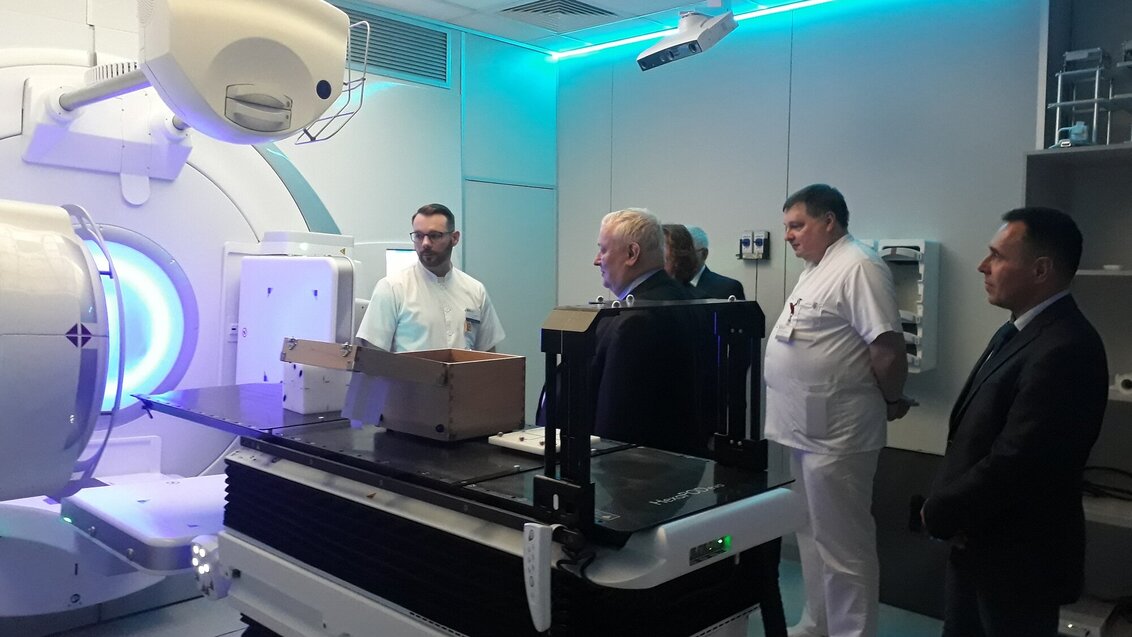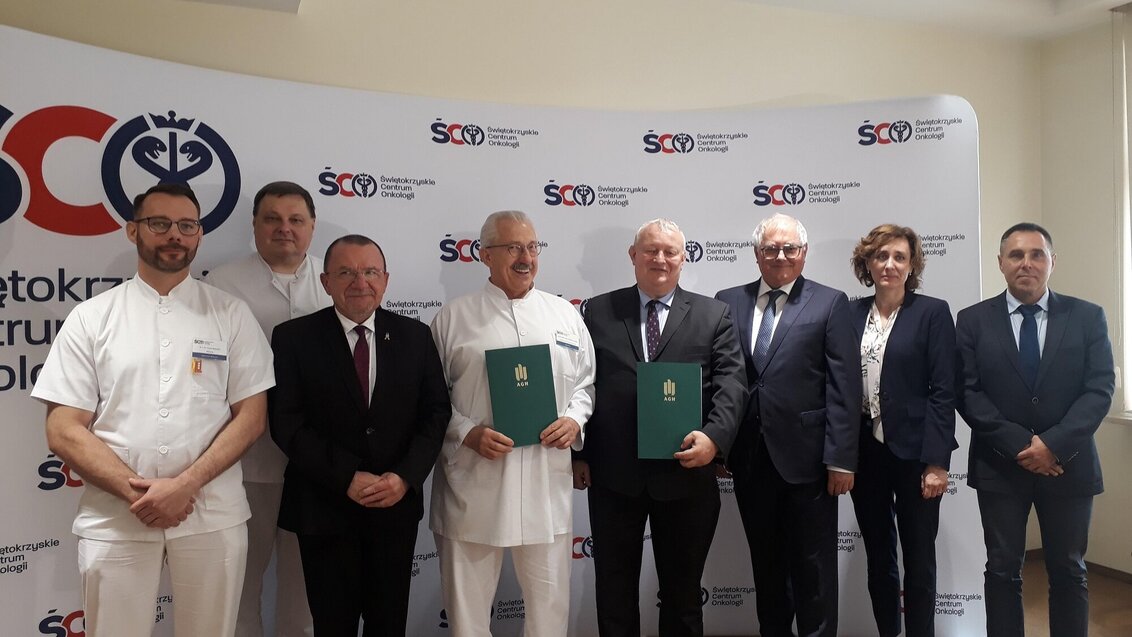The AGH University of Krakow and Holy Cross Cancer Centre in Kielce (HCCC) have concluded an agreement on cooperation aimed at serving patients. One of the first research projects will concern using artificial intelligence in planning and controlling the quality in radiotherapy treatment.
As explained by the AGH University Vice-Rector for Cooperation, Prof. Rafał Wiśniowski:
“The AGH University together with the newly established Center of Excellence in Artificial Intelligence aim at the competences of our employees serving the development and commercialisation of solutions supporting various areas of economic activity, including the key ones such as the health care. Nevertheless, real challenges faced by business entities that could be solved together must be formulated by our partners. That is why the signed agreement constitutes a link connecting two institutions which, by cooperating, can successfully solve complex issues with positive results for the entire society.”
Prof. Stanisław Góźdź, the Director of the Holy Cross Cancer Centre, precised that:
“Oncology faces an enormous challenge which is the continuously growing incidence of cancer. That is why we have joined forces with researchers from the AGH University to develop and introduce innovative technological solutions, such as artificial intelligence, into our practice, which will enable us to treat patients more safely and effectively.”
The science and research team will consist of medical physics specialists from the Department of Medical Physics and doctors from the Department of Radiotherapy at the HCCC collaborating together. On the part of the AGH University, the agreement will be implemented by the Department of Biocybernetics and Biomedical Engineering (Faculty of Electrical Engineering, Automatics, Computer Science, and Biomedical Engineering) which will provide support in the analysis and interpretation of medical data, including imaging studies, with the use of artificial intelligence methods.
“The use of computer methods in supporting procedures in oncology has been present in research conducted at the Department of Electrical Engineering, Automation, Computer Science, and Biomedical Engineering for many years. Research projects carried out in recent years have concerned both the development of methods for analysing images acquired during imaging studies of oncology patients, statistical methods in controlling the correctness of the implementation of radiotherapy plans, and the construction of phantoms for calibrating equipment used in radiotherapy. Cooperation with the team of the Holy Cross Cancer Centre, access to data, measuring and therapeutic devices at the disposal of the Centre open up new prospects for research in this area and allow us to think of new challenges, which is the essence of research activity,” added Prof. Zbisław Tabor, coordinator of the cooperation from the AGH University.
As explained by Dr Paweł Wołowiec, a specialist in medical physics, director of the HCCC Department of Medical Physics, computer models for analysing radiation therapy treatment plans for inaccuracies associated with their implementation will be created within one of the planned steps.
“These inaccuracies can result from mechanical parameters of the accelerator, differences in the positioning of a patient, or changes in a patient’s anatomy during the entire treatment. The knowledge on the uncertainty of dose distribution calculations in an individual treatment plan, based on the models created, will help us decide on the optimal treatment plan for the patient.”
Necessary for the development of such models is, among other things, the information on patient’s anatomical changes in the course of the entire radiotherapy treatment (even 6 weeks). Such information can be obtained by means of the Cone-Beam Computed Tomography (CBCT) which are used to verify the patient's positioning before the start of each therapy session.
“CBCT scans will allow for the creation of models reflecting the patient's anatomical changes throughout the treatment. This is what our partners from the AGH University will be tasked with,” Dr Paweł Wołowiec stated.
The long-term cooperation between the HCCC and the AGH University implies, among other things, joint interdisciplinary research, the creation of joint research programs, and the acquisition of funding for scientific and research projects from national and international funds. The agreement also entails expert evaluation of potential solutions and ideas in the context of medical applications. The University and the Center declare that they will conduct preliminary research together, conditioning the possibility of applying for financing of research projects or attempting clinical verification of the solutions developed by them. The cooperation between the medical and technical communities may also contribute to an increase in the number of published results of jointly conducted research in both medical and technical journals of international scope.


 AGH University Bioceramics Team with a gold medal in Geneva
AGH University Bioceramics Team with a gold medal in Geneva  Pre-election meeting with a candidate for the position of rector
Pre-election meeting with a candidate for the position of rector  Agreement on cooperation with OPAL-RT
Agreement on cooperation with OPAL-RT  Krakow DIANA Accelerator consortium members with an agreement
Krakow DIANA Accelerator consortium members with an agreement  Meeting with the Consul General of Germany
Meeting with the Consul General of Germany  Professor Jerzy Lis re-elected as AGH University Rector
Professor Jerzy Lis re-elected as AGH University Rector  Launch of AGH University Student Construction Centre
Launch of AGH University Student Construction Centre